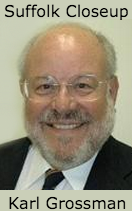It was an off-year election in 2015 which carried an important message in Suffolk County: big-moneyed political intervention by special interests didn’t work here.
 In Riverhead, incumbent town supervisor Sean Walter had the courage to challenge the Suffolk Police Benevolent Association’s desire to have the Suffolk County Police Department take over policing in Riverhead. He won an extraordinary minor line victory—despite big money poured into both a primary campaign against him and the general election race by the Suffolk PBA and a “super-PAC” it set up.
In Riverhead, incumbent town supervisor Sean Walter had the courage to challenge the Suffolk Police Benevolent Association’s desire to have the Suffolk County Police Department take over policing in Riverhead. He won an extraordinary minor line victory—despite big money poured into both a primary campaign against him and the general election race by the Suffolk PBA and a “super-PAC” it set up.
He was knocked off the Republican ticket in favor of a town board member, Jodi Giglio, who the Suffolk PBA and its “super-PAC” supported. He was left running on the Conservative line alone. And although minor parties have been providing votes adding to victories of major party candidates in Suffolk, nominees don’t win running on a single minor party line alone. But Mr. Walter did.
The election results blunted in Riverhead what’s been a decades-old push by the PBA and other Suffolk police unions to extend the Suffolk Police Department into parts of the county which didn’t eliminate their town and village departments in favor of coverage by a county department when it was set up in 1960. This includes all of the East End and several villages in western Suffolk. The unions have been joined by Suffolk officials who have felt an expansion would help relieve the burden of the county department being financed mainly through a property tax levied on people living in the western Suffolk “police district”—a tax that has been steadily increasing.
Politically, the police unions have become major players in Suffolk. That’s not just my analysis. As Newsday’s political writer, Rick Brand, noted in an article last year: “The Suffolk Police Benevolent Association has become the $1.3 million gorilla of county politics. That’s the amount the Long Island Law Enforcement Foundation—set up by the police union—has spent over the past three years.”
On the federal level, the Hatch Act of 1939—its full title: An Act to Prevent Pernicious Political Activities—limits federal government employees from engaging in political activities. Is it not time for limits on county police government employees being a “gorilla” in politics?
Meanwhile, in East Hampton, the companies behind what’s become Long Island’s biggest noisemaker—helicopter traffic between Manhattan and the East Hampton Airport—went all-out to defeat the Democrats running for East Hampton Town Board. The board’s Democratic majority had the courage, after all, to put limits on the hordes of aircraft providing a raucous aerial ferry service from the city to the town-owned airport, especially choppers flying low and loud over Long Island, disturbing people for years.
It was an “outright rejection of the attempted corporate takeover of East Hampton’s Town Board by the aviation industry,” says Kathleen Cunningham, chair of the Quiet Skies Coalition. The “industry showered the challengers with nearly $400,000 hoping to unseat the Cantwell administration, the first in the town’s history to take real steps to protect the public from aircraft noise. It was a shocking and unprecedented display of business interests looking to buy their way into local politics.”
Larry Cantwell, the Democratic incumbent supervisor of East Hampton, was swept back into office with nearly double the votes of his GOP opponent. His Democratic running mates won big.
Said former East Hampton Town Board member Job Potter: “The overwhelming landslide is a clear statement from the people of the town that outside commercial interests cannot buy our town—good candidates and good policies win election!”
The acceptance of huge amounts of money by the East Hampton GOP from aviation interests—three-quarters of what they spent in their campaign—was shocking. And it wasn’t as if the GOP candidates were some renegade band. Topping the Republican ticket, running for supervisor, was Tom Knobel, otherwise the East Hampton GOP chairman. Joining with the noisemakers, boosting the aviation industry, had become the party line.
An election mystery is why the Suffolk GOP nominated an unknown in Suffolk to run against Democratic incumbent County Executive Steve Bellone. “We talked about the right issues,” said James O’Connor of Great River in his concession speech. Indeed, the former North Hempstead Town councilman challenged Mr. Bellone of North Babylon on such issues as his campaign finance links to police unions. “Bellone paid back the unions by giving members of the Suffolk Detectives Association salaries of $227,000 per year,” an O’Connor flier declared.
The Suffolk GOP has a strong bench. Long-time State Assemblyman Mike Fitzpatrick of Smithtown, for example, would have made a stronger candidate against Mr. Bellone.
If the GOP is to win, it needs top candidates — and to not take tainted dollars.
Karl Grossman is a veteran investigative reporter and columnist, the winner of numerous awards for his work and a member of the L.I. Journalism Hall of Fame. He is a professor of journalism at SUNY/College at Old Westbury and the author of six books. Grossman and his wife Janet live in Sag Harbor.
Suffolk Closeup is a syndicated opinion column on issues of concern to Suffolk County residents.
The survival of local journalism depends on your support.
We are a small family-owned operation. You rely on us to stay informed, and we depend on you to make our work possible. Just a few dollars can help us continue to bring this important service to our community.
Support RiverheadLOCAL today.






























